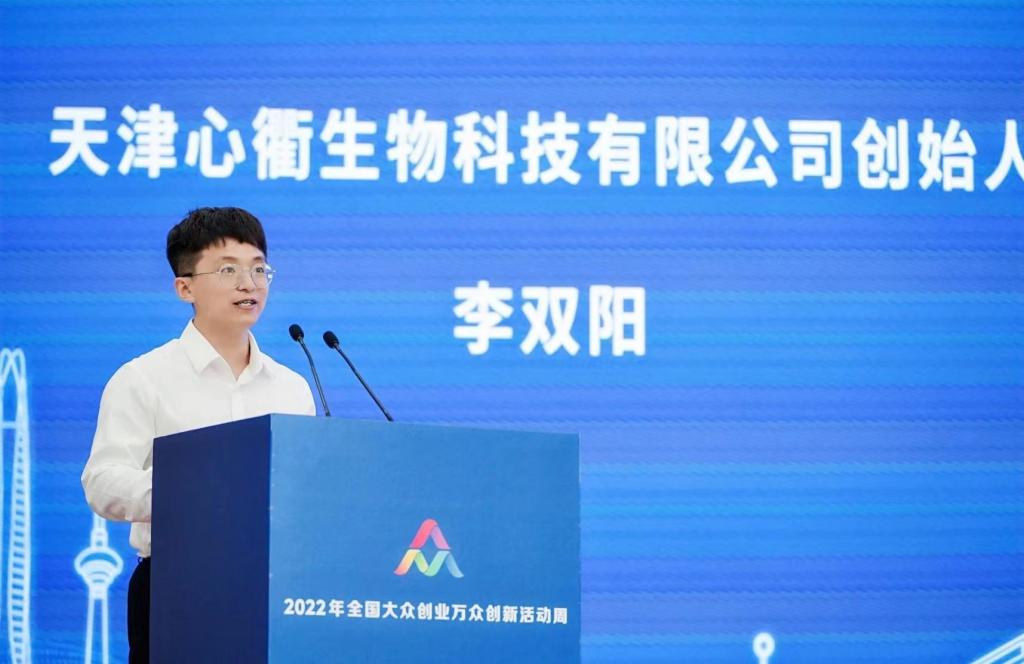
Inject slowly the hydrogel prepolymer into the small caliber artificial blood vessel mold and gently hold the mold in just 10 minutes, a 6cm long and 6mm diameter artificial blood vessel was created. Its strength and flexibility can be comparable to the natural blood vessels after test. This is the highlight of the finals of the 8th "Creation of Youth" China Youth Innovation and Entrepreneurship Competition.
According to Report on cardiovascular Health and Diseases in China 2019, there are currently 330 million cardiovascular disease patients in China. Small caliber blood vessels were used in the treatment of cardiovascular diseases for vascular replacement. However, there are no commercial small caliber artificial blood vessel products worldwide. For this reason, Li Shuangyang, a doctoral student at Tianjin University who was born after 1995, developed the world's first invivo precise visualization of small caliber artificial blood vessels from thebiomimetic perspective. In order to commercialize research achievements, he set up an entrepreneurial team and established a technology companyTianjin Xinqu Biotechnology Co., Ltd., which was launched into theTiankai Higher Education Innovation Park (Tiankai Park) in Tianjin.
“We have received many offers from many entrepreneurial parks, but we finally choose to settle in Tiankai Park in Tianjin. Tianjin has made every effort to build Tiankai Park, drawing on the experience of first-class science and technology innovation parks at home and abroad and rolled out 34 measures based on the actual conditions in Tianjin. With a distinctive supporting system, we can feel the wonderful atmosphere for innovation and entrepreneurship.” Li Shuangyang said. With these substantial policies, he determined to start up his business in Tianjin.
“Currently, self-blood vessel is still seen as an ideal substitute for damaged blood vessels. However, it has some limitations.” Li Shuangyang said. Firstly, the source of self-blood vessels is limited. It requires a healthy blood vessel from the patient’s body which will inevitably cause secondary trauma to the patient and may also lead to complications. For many patients, it’s difficult to find an ideal blood vessel from themselves for transplantation. "Polyurethane and polytetrafluoroethylene cannot solve the problems existing in small caliber artificial blood vessels, so we chose to replace them with the hydrogel that our research group has been studying, and creatively proposed the concept of double-layer hydrogel." The material was chosen because of its appropriate mechanical strength and its good biocompatibility which can reduce the immune rejection response of the organisms.
Li Shuangyang’s team took the anticoagulant zwitterion hydrogel layer as the inner wall of blood vessels for the first time, so that the lumen has super hydrohilicity and better superlubricity than the surface of natural vascular endothelium which prevents the formation of the mural thrombus because the proteins can’t be attached on. In addition, such artificial blood vessels can avoid infiltration of inflammatory cells, reduce inflammation, and avoid proliferation and stenosis due to the smaller pore size than the cell size. It is also worth mentioning that the fluorinated hydrogel in the inner layer of the blood vessel can not only prevent blood clotting, but also increases the visualization performance of the artificial vessel, which can help doctors to conduct non-invasive and accurate monitoring of the shape of the implanted artificial vessel, and can obtain accurate, dynamic and overall three-dimensional information at any time.
After more than three years of assiduous study, the "precise visualization of small caliber artificial blood vessels in vivo" has finally been successfully developed. To date, compared with the latest internationally reported technology, the preparation cycle has been reduced from 1.5 months to 10 minutes. More importantly, the technology they adopt greatly reduces production costs compared to traditional tissue engineering techniques.
Li Shuangyang's Tianjin Xinqu Biotechnology Co., Ltd. has recruited some junior students and formed a team with cross disciplinary backgrounds and complementary advantages. Now, relying on the platform of Tianjin University, Li Shuangyang and his team have successfully settled in the Tiankai Park. “The supporting policies of Tiankai Park provides 'one-on-one' and considerate services for enterprises in the park. Such thoughtful service makes it convenient for us to connect with various departments. I believe that after the opening of Tiankai Park, we will receive greater support in entrepreneurship, talent recruitment and financing negotiations.” Li said.
Li Shuangyang's office in Tiankai Park is less than one kilometer away from the Weijin Road Campus of Tianjin University, the Chinese Academy of Medical Sciences and Peking Union Medical college Institute of Biomedical Engineering and Other places for research and development. Now the team has developed a series of products such as "bionic artificial blood vessel with self-healing function", "long-term anticoagulant coating for the surface of blood contact material" and "pericardial anti-adhesion patch".
“I hope that the 'two wings' of Tiankai Park in the future can provide more shared laboratories and other scientific research creations for research enterprises like us, and we will also use the continuous innovation and development of the enterprise to give back to the park.” Li Shuangyang expressed his greatest hope that “within 5 years, we can bring at least one technology to market and our ultimate goal is to apply small caliber artificial blood vessels to clinical practice.”
By Hou Shuangning
Editor: Sun Xiaofang






